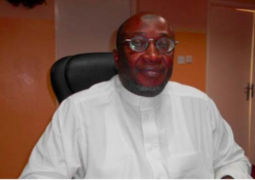“… he will swallow up death forever.” (Isaiah 25:8)
As the group of women headed to the grave where their Master, Jesus, had been buried, they had one major preoccupation at heart - who would roll the stone away? It was a genuine concern in that the grave where Jesus was laid had been sealed with a ‘big stone’ and they could not physically roll it away. Unbeknown to the women, stiff security measures had been put in place to render the grave more secure as the chief priests and Pharisees were suspicious about the intents of Jesus’ disciples. “We remember that while he was still alive that deceiver said, ‘After three days I will rise again.” (Matthew 27:63) This gave rise to the fear that his disciples would sneak in during the wee hours of the morning “to steal his body and tell the people that he has been raised from the dead.” (Matthew 27:64)
On that fateful Friday, Joseph of Arimathea, a prominent member of the Council, “who had himself become a disciple of Jesus,” had claimed his body for burial and Pilate had granted it. He had done what was necessary for the burial. “Joseph bought linen cloth, took down the body, wrapped it in linen, and placed it in a tomb cut out of rock.” (Mark 15:46) The women who had been following Jesus, namely: Mary Magdalene, Mary the mother of James and Joses and the mother of Zebedee’s sons who were part of his entourage, “saw where he was laid.” Nothing happened the next day; it was the Sabbath.
“On the first day of the week, very early in the morning, the women took the spices they had prepared and went to the tomb.” (Luke 24:1) These women’s motive had been to conduct the final funeral rites in keeping with the norm. But then, it seemed there could be a serious obstacle awaiting them. Who would roll the stone away for them, so they could gain access to the tomb?
Even with the best of intentions, problems can emerge from nowhere and we find ourselves up against some unexpected hurdle for which also we were not prepared and therefore have no apparent solution. However, life has taught us that our fears and worries are for the most part unfounded and far removed from reality. In other words, we worry unnecessarily. To their utter amazement, when the women got to the grave, “They found the stone had been rolled away.” (Luke 24:1)
Thus, their problem had been solved. They had expressed serious concern about access to the tomb and now the stone had been rolled away. But that in itself was equally upsetting because the open grave meant the tomb was empty. Here was another matter to contend with. How would they go about the mission - for which they had left their homes that early - in the light of this novel event?
Well, God always works his purpose out and nothing can stop him. David, the man according to God’s own heart had prophesied that Jesus’ body would not rot in the grave. “… because you will not abandon me to the grave, nor will you let your Holy One see decay.” (Psalm 16:10) The Holy One triumphed over death. Prior to the decomposition process, Jesus had already conquered death. Death could not hold him captive. He had resurrected!
As they were debating the next steps, two angels appeared to the women with the question: “Why do you look for the living among the dead? He is not here; he is risen! Remember how he told you, while he was still with you in Galilee: ‘The Son of Man must be delivered into the hands of sinful men, be crucified and on the third day be raised again.” (Luke 24:5-7)
Understand their emotions; being raised from the dead is not a common occurrence. In their minds, someone has done an awful deed. But their fears were allayed. The angel said: “Come and see the place where he lay. Then go quickly and tell his disciples: ‘He has risen from the dead and is going ahead of you into Galilee. There you will see him.’ ” (Matthew 28:6-7) From henceforth their eyes began to open and all the pieces of the jig-saw puzzle seemed to fit.
He himself had on three occasions revealed to his disciples that he would die and be raised from the dead, but it had not registered. The first time around he had spoken in coded language and they could not understand. “Destroy this temple and I will raise it again in three days.” (John 2:19) Thereafter, he had to lay it bare and plain. “I lay down my life only to take it up again. No one takes it from me, but I lay it down of my own accord. I have authority to lay it down and authority to take it up again.” (John 10:17) Things began to take shape only after his resurrection when they recalled some of his utterances.
At the death of his friend Lazarus, Jesus had made a statement that Mary herself did not quite understand. “I am the resurrection and the life. He who believes in me will live, even though he dies; and whoever lives and believes in me will never die. Do you believe this?” (John 11:25-26) After Lazarus was brought back to life, Jesus reminded Mary: “Did I not tell you that if you believed, you would see the glory of God?” (John 11:40) As was with Mary, Jesus is asking you and me a personal question; ‘Do you believe this?’ that I could conquer death.
If he did not, then the Christian faith has no grounds to stand on. Adam brought about death through sin. Jesus conquered death so that we should not be afraid of dying. Death has no power over us. Jesus has by his resurrection broken the hold sin and death had over you and me. ‘Do you believe this?’
Our hope in life does not end here; it goes beyond what the natural eye can see, into the spiritual realm. Death has ceased to be an end in itself, to become a trap door, a transit point to heaven. Death has lost its sting. It can no longer bite effectively. “But Christ has indeed been raised from the dead, the firstfruits of those who have fallen asleep. For since death came through a man, the resurrection of the dead comes also through a man. For as in Adam all die, so in Christ shall all be made alive.” (1 Corinthians 15:21) ‘Do you believe this?’
Our Lord Jesus declares: “Do not be afraid I am the First and the Last. I am the Living One; I was dead and behold I am alive for ever and ever! And I hold the keys of death and Hades (hell).” (Revelation 1:17:18)
At the resurrection, God’s glory is fully displayed. We have a ticket to his kingdom through the finished work of his Son on the cross of Calvary.



